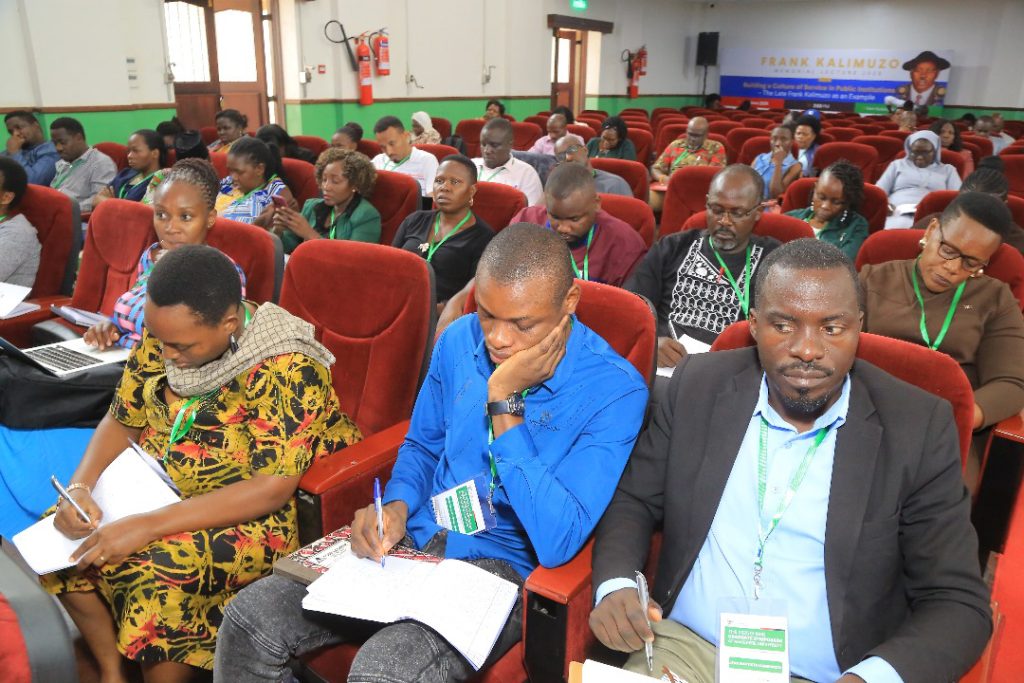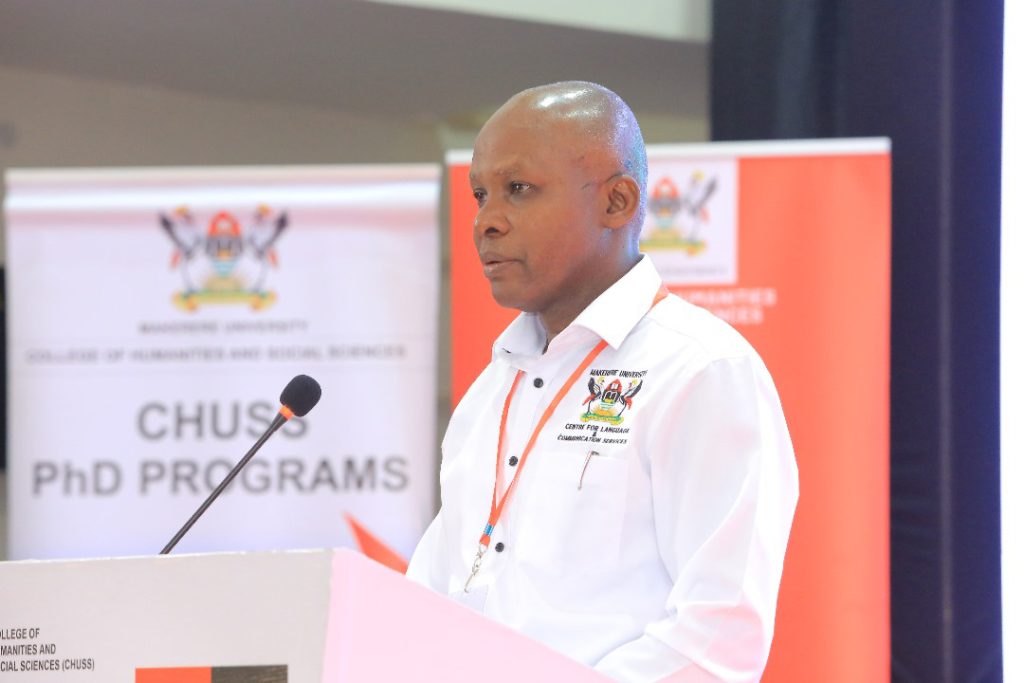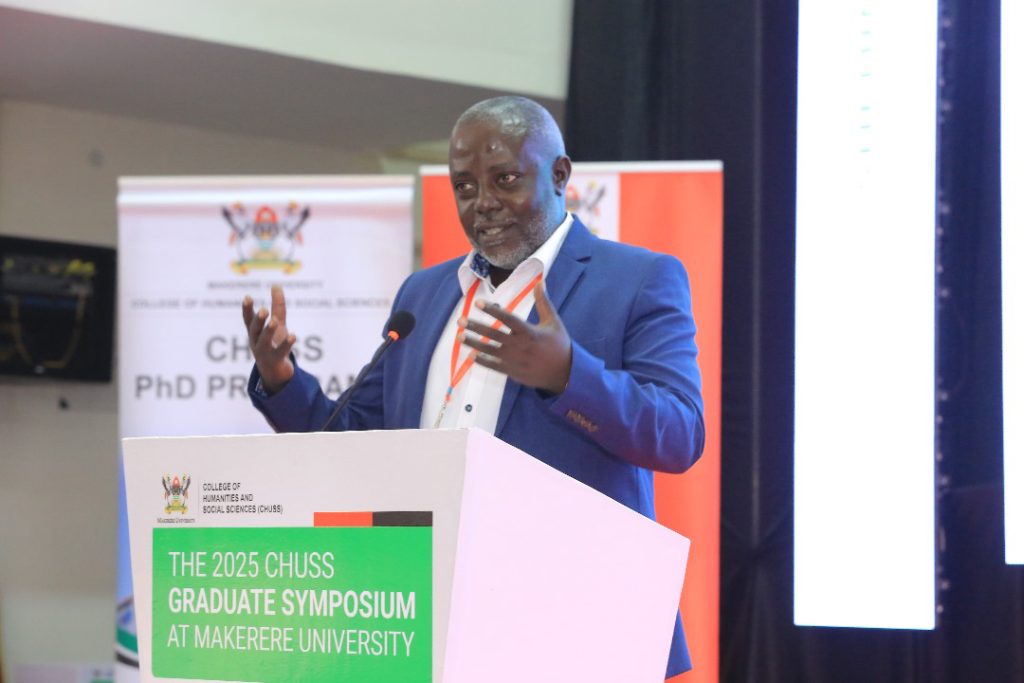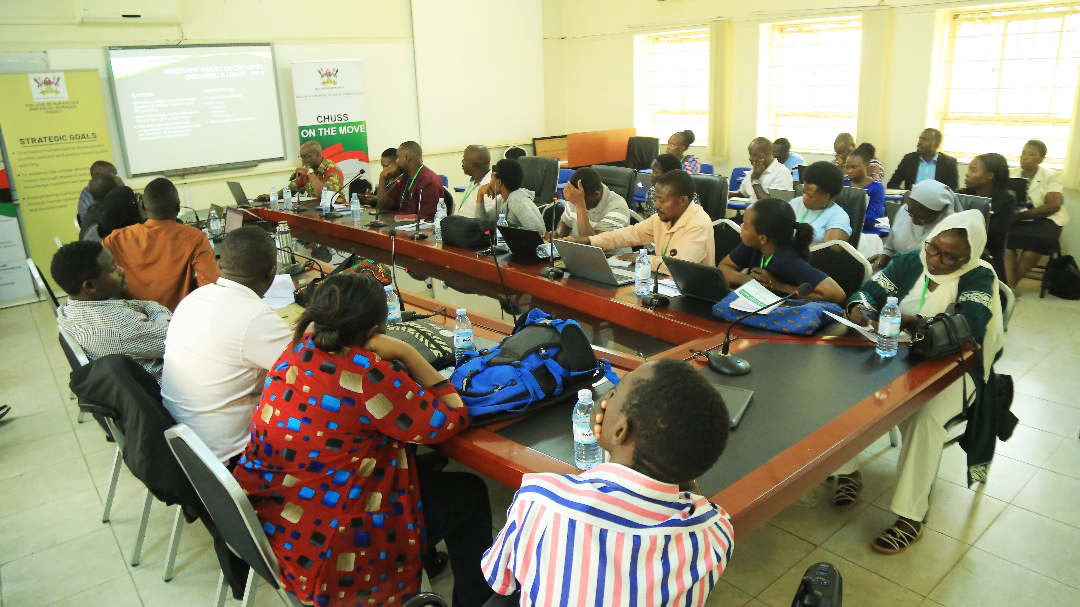By Jane Anyango
Makerere University, Kampala | June 20, 2025
In a bold declaration at the opening of the inaugural 2025 CHUSS Graduate Symposium, Makerere University has committed to a transformative research agenda, tasking its PhD students to be engines of social change, innovation, and development.
The symposium, hosted by the College of Humanities and Social Sciences (CHUSS) and attended by over 80 PhD candidates from Uganda and the broader PANGeA network, was officially opened by Professor Buyinza Mukadasi, Deputy Vice Chancellor for Academic Affairs, on behalf of Vice Chancellor Professor Barnabas Nawangwe.
The three-day symposium (19-21 June 2025) hosted with support from the Lisa Maskell Fellowship aimed to showcase research, share knowledge, and strengthen mentorship in graduate education and networking. Day one was dedicated to the Graduate writing workshop and the second day kicked off with an official opening ceremony.
Speaking to participants, Prof. Buyinza emphasized Makerere’s strategic shift toward becoming a research-intensive university, underscoring the pivotal role of graduate students in building a “knowledge economy” that addresses Africa’s pressing social and economic challenges.
“We must train not just more PhDs—but the right kind of PhDs. This is not a numbers game. It’s about quality, relevance, and impact,” Prof. Buyinza said. “Research is unimportant unless it is relevant.”
A Million-PhD Ambition
Uganda currently produces only 200 PhDs annually, but Prof. Buyinza announced the university’s vision to help the nation reach an ambitious target of one million PhDs in a decade. He warned that without drastic improvements in completion rates and graduate output quality, this vision will remain out of reach.

“We need to scale up efforts. Completion rates remain poor. Many start, but few finish. That’s why gatherings like this symposium are critical,” he noted.
The deputy VC challenged doctoral candidates to ensure their research directly serves communities, urging them to become “the soul of the nation” by translating knowledge into social transformation.
Not a PhD Factory—But a Center of Excellence
While committing to increased output, Prof. Buyinza pushed back against the notion of mass production, stating that Makerere is “not a PhD factory.”
“We want graduates with relevant skills—graduates who will solve problems, drive policy, and change lives,” he said. “If your research doesn’t impact society, it’s a waste of resources.”

The symposium was made possible through funding from the Lisa Maskell Fellowship and brought together scholars from across East and Southern Africa under the PANGeA initiative. Prof. Buyinza hailed CHUSS for its renewed academic vibrancy and role in shaping future intellectual leaders.
“You are producing the cream of the nation. And we believe that together—with faculty, government, and development partners—we can sustain Makerere as a premier research university on the continent,” he said.
“We Are the Mine of Excellent Minds” — CHUSS Principal Commits to Nurturing Uganda’s Next Generation of Scholars
Associate Professor Helen Nambalirwa Nkabala, Principal of the College of Humanities and Social Sciences (CHUSS), reaffirmed the college’s unwavering commitment to fostering high-quality graduate education and positioning humanities at the heart of Uganda’s national transformation.
Prof. Nkabala described CHUSS as “the mine of excellent minds,” vowing to continue supporting graduate students in producing timely, impactful, and world-class research.
“As a college, we are very intentional about ensuring that our graduate students thrive,” she said. “We shall continue to support you because it is through you that this university will realize its dream of becoming a research-led institution.

Prof. Nkabala celebrated CHUSS’s evolution, pointing to the successful transition of the School of Women and Gender Studies into a full-fledged institute as an example of the college’s legacy of growth and academic excellence.
“We didn’t lose a child — we gave away a thriving one. The institute remains a proud child of CHUSS,” she quipped.
She honored the enduring contributions of retired faculty and supervisors, many of whom continue to mentor graduate students across the region. “At CHUSS, we never say goodbye,” she said, acknowledging professors who, despite relocating or retiring, remain active in guiding the college’s academic mission.
Prof. Nkabala invited applause for the graduate students in attendance, praising their commitment to timely completion and academic excellence.
“What you see here is a committed crop of scholars. The faces before you will reappear at graduation in January,” she confidently told the gathering, reinforcing CHUSS’s strong record of research output and graduation rates.
She also commended the coordination team and facilitators of the symposium — including local and international partners — for their “sleepless nights building not farms, but futures.”
A Call for Intentional Innovation
The Principal emphasized the importance of turning visionary ideas into formal innovation, including the potential patenting of unique academic concepts emerging from CHUSS. She urged departments to explore the university’s intellectual property frameworks and pledged institutional backing.

“There’s no better way to honor the legacy of our recently transitioned excellent mind than fulfilling just a fraction of his dreams,” she said, referencing a late scholar who inspired many within the college.
In her closing, Prof. Nkabala reiterated the broader mission of humanities and social sciences in national development:
“All the work that comes out of CHUSS is excellent — not because we are excellent only, but because we are the mine of excellent minds. And we shall continue mining.”
Beyond the PhD: Prof. Grace Musila Urges Scholars to Pursue Well-Being, Growth, and Integrity in Academic Life
Delivering a powerful keynote address on life after a PhD, Professor Grace Musila challenged emerging scholars to reimagine life after a PhD—not as a destination, but as a lifelong journey of intellectual growth, personal integrity, and communal contribution.
Drawing on over 17 years of postdoctoral experience across African and global institutions, Prof. Musila urged early-career academics to resist stagnation. “If you forget everything else I say today,” she told the room, “remember this: be careful not to plateau.”
Redefining the “Good Life” After the PhD
Rejecting neoliberal definitions of success based on consumption and status, Prof. Musila offered an alternative rooted in holistic well-being.

“I prefer to speak in the grammar of well-being, not success,” she said. “A good life is one where we operate in equilibrium—physically, psychologically, financially, and spiritually. It’s about learning, growing, and contributing meaningfully.”
She reminded scholars that a PhD is not an endpoint, but a license to explore deeper intellectual and ethical terrains. “It gives you the permission to chart your path, but you must stay hungry, curious, and committed to personal development.”
Networks Don’t Grow Like Weeds: Cultivating Academic Community
One of the central themes of Musila’s talk was the value of intentional, reciprocal networks.
“Networks are like crops,” she said. “If you abandon them, they will abandon you. They need to be cultivated with effort and care.”
She cautioned against becoming passive or extractive participants in academic communities—what she described as “sponging.” Reciprocity, she stressed, is essential: “Your presence must feed the network as much as you draw from it. Academia is a small pond.”
Stay Intellectually Fit: Lifelong Learning as a Discipline
Musila introduced the concept of intellectual fitness, describing it as essential to academic vitality.
“You must feed your mind intentionally—beyond teaching and admin,” she said. “Curiosity is your intellectual gym.”
She encouraged practical routines: reading journal tables of contents, attending virtual seminars and book launches, setting up Google alerts for key scholars, and tracking both Global North and Global South publishing trends.
“If you’re only reading what you teach or supervise,” she warned, “you risk becoming a secondary illiterate.”
Integrity Is a Face Card That Never Declines
Musila emphasized integrity as academia’s most valuable currency. “By the time you earn a PhD, everyone knows you’re smart,” she said. “The question is: can you be trusted? Can you be fair, accountable, and kind?”
She acknowledged the difficulty of maintaining ethical standards in environments where corruption is normalized, but insisted that integrity remains non-negotiable.

“In a world that rewards corner-cutting, choose to be gold—because gold never depreciates.”
She also highlighted the importance of goodwill in academic systems built on peer review, mentorship, and collaboration—often unpaid labor. “Am I contributing to the ecology of goodwill, or only taking from it?” she challenged the audience.
Initiative and Intergenerational Impact
Closing her keynote, Prof. Musila called on graduate students to build peer support networks, host reading groups, and contribute to their academic communities from day one. Citing her own Mashariki Literary and Cultural Studies collective—formed from informal academic friendships—she illustrated how small initiatives can evolve into lasting institutions.
“Many of the academic associations that shape our fields started as coffee conversations,” she said. “The baton is in your hands. Don’t wait. Start now.”
She concluded her speech with a moment of silence in honor of the late Prof. Ngũgĩ wa Thiong’o, dedicating her address to the literary giant and fellow Makerere alumnus
Final Message: Who Will You Become?
Prof. Musila’s message to Makerere’s doctoral community was clear: the PhD is just the beginning. What comes next depends on your commitment to growth, reciprocity, and moral clarity.
“Stay curious. Stay generous. Stay grounded. And never let yourself go,” she said to a standing ovation.
Her final words left a lasting imprint:
“Life after the PhD is not about chasing success. It’s about choosing the kind of scholar—and human being—you want to be.”
“From a Platform to a Pillar: Dr. Levis Mugumya Celebrates the Growth of the CHUSS Graduate Symposium”
Dr. Levis Mugumya, Administrator of the Gerda Henkel Project at Makerere University, took the audience through a reflective and celebratory journey of the evolution of the symposium. Tracing its roots back to 2018, Dr. Mugumya reminded participants that what began as a modest platform for early-career scholars has grown into a vital pillar of academic exchange within the College of Humanities and Social Sciences and beyond.

“This year’s edition is unique,” he said, “not because of a defined theme, but because we chose to give space to a wide array of doctoral work—whether at proposal stage or nearing completion.” He emphasized the inclusive nature of the symposium, where even those outside Makerere, particularly from the PANGeA network, were welcomed to share their scholarly journeys.
With a blend of pride and gratitude, Dr. Mugumya acknowledged the crucial financial support of the Gerda Henkel Foundation, which he credited for removing barriers like registration fees and enabling full participation. He further praised the tireless work of faculty supervisors, department heads, deans, and the organizing team, noting that these collective efforts ensure doctoral fellows not only complete their research within the stipulated three years but do so with quality and community.
“We received 91 abstracts this year and accepted 82 for presentation,” he said. “That is no small feat. It’s evidence of the thriving research culture we are building together.”
Dr. Mugumya also paid tribute to Professor Grace Musila, the keynote speaker, calling her a long-standing intellectual partner whose consistency and commitment to the CHUSS academic community was both rare and invaluable.
He closed his address by recognizing the behind-the-scenes contributors—organizers, facilitators, IT support, and the PR team—whose often-invisible labor made the symposium possible. “Let us use this space to engage, to share, and to grow,” he said. “This is more than a symposium. It is a statement of our collective academic vision.”
“Building Bridges of Belonging: Dr. Edgar Nabutanyi on Legacy, Networks, and Nurturing Future Scholars”
In a heartfelt and reflective address Dr. Edgar Nabutanyi, Project Administrator and Symposium Convener, moved beyond formalities to deliver a personal meditation on mentorship, scholarly networks, and the intergenerational responsibilities of academia.
Dr. Nabutanyi contextualized the symposium within Makerere University’s larger transformation into a research-led institution. Citing a reported improvement in graduate training rates—from 9% to 16%—he asserted that “this graduate symposium is one of the building blocks” of that vision. He praised recent council decisions, such as post-retirement contracts for professors, as critical to nurturing expertise in Africa’s academic future. In a recent council decision, post retirent contracts for associate professors and professors were extended to the ages of 75 and 80 years respectively.

But it was his deeply personal storytelling that brought his remarks to life.
Recounting how Professor Sister Dominic Dipio entrusted him, fresh into the department in 2008, with organizing the prestigious David Cook Memorial Lecture, Dr. Nabutanyi reflected on how that single act of trust shaped his scholarly path. “We are always generational,” he said, “and one generation must prepare the next.”
His narrative then turned to Professor Grace Musila, the keynote speaker, whom he first encountered in 2009 through a call for papers on East African intellectual traditions. Despite lacking the funds to attend the conference, he was encouraged by Musila to apply for the Stellenbosch PhD program—a gesture that changed his life. “That journey,” he said, “has been good for me, for my family, for the department of literature, and for Makerere University.”
His testimony was a powerful reminder of the emotional and intellectual bonds that shape academic communities. “Fifteen years from now,” he told the graduate students, “you will reflect on how someone in this room—your supervisor, a coordinator, a colleague—made you feel. That is what will carry you through.”
As a closing gesture, Dr. Nabutanyi acknowledged the many colleagues, past and present, who have supported CHUSS’s scholarly journey and contributed to building a dynamic and sustainable intellectual ecosystem. “It is in this spirit,” he said, “of shared legacy and communal commitment, that we welcome our keynote speaker to lead us in reflecting on scholarly networks after the PhD.”
In that moment, it was clear that Dr. Nabutanyi was not only a convener of symposia but a custodian of academic memory—ensuring the torch of scholarship continues to burn across generations.

